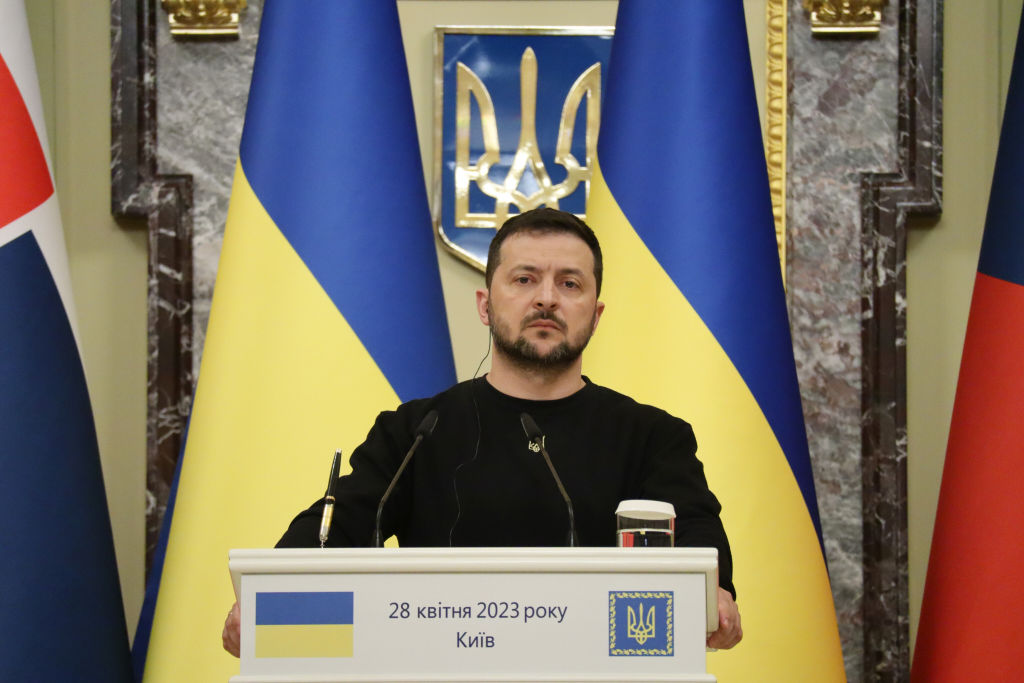Could one of Ukraine’s staunchest allies in Europe soon flip to become one of the most sceptical nations in the West when it comes to military and political aid? That question is troubling Kyiv and the EU, as a political crisis in Slovakia leaves the door wide open for a party to take over which is more hostile to Ukraine.
It was announced on Sunday that a technocratic caretaker government will be formed next week following the resignation of the Slovak prime minister, Eduard Heger. An election is expected in September, which the left-wing populist and Ukraine-sceptic Robert Fico is now favourite to win.
While the vast majority of Slovak politicians and media are strongly pro-Ukraine, much of the electorate is either ambivalent about the war or even actively pro-Russian
Heger’s resignation marks the culmination of a farcical long-term political crisis in Slovakia. Members of his own caretaker regime had departed one by one, eventually leaving him in sole charge of various ministries including health, foreign affairs, finance and agriculture. After months of bitter internal wrangling, his coalition government lost a vote of no confidence in December and elections are scheduled for September 30. Heger was not even elected as prime minister – he took up the role after his predecessor, Igor Matovič, became so unpopular that his coalition partners refused to work with him.
When it comes to problems with democratic representation, Slovakia is far from alone in central and eastern Europe. Poland and Hungary have long been the bêtes noires of the EU’s political and media class for their treatment of the judiciary and the media. Even the Czech Republic, Slovakia’s close neighbour and one of the region’s more stable democracies, arguably has a problem with shutting down debate on contentious issues such as EU membership or support for Ukraine.
Yet Slovakia’s problems run deeper. Its proportional representation system leads to a horribly fragmented political landscape, with a conveyer belt of small political parties guaranteeing instability. Most of these parties poll at below 10 per cent – and have been created by firebrand personalities who constantly fall out and refuse to work with each other ever again.
This means that personal enmities cripple the functioning of the state. After the chaos of recent months, many of the country’s major political figures loathe each other so much that it’s far from certain a functioning coalition with be achievable even after the elections in September, even though various combinations should be possible from an ideological perspective.
There is one party, though, that seems strong enough to lead a government – and it’s not good news for Ukraine or the EU. The left-wing populist SMER Social Democracy party is ahead in the polls, fronted by two-time former prime minister Robert Fico, Slovakia’s most controversial politician and a stern critic of the western response to the Ukraine war.
A wily old campaigner, Fico has now made opposition to military support for Ukraine his calling card. After Heger announced a shipment of old MiG fighter jets to Kyiv in March, Fico complained ‘these fools are dragging us into war and have painted targets on our backs just to please the Americans and the European Union.’
Fico is accused of stoking fear with this rhetoric, but his supporters argue that he merely fills a political vacuum. While the vast majority of Slovak politicians and media are strongly pro-Ukraine, much of the electorate is either ambivalent about the war or even actively pro-Russian. One controversial survey conducted in 2022 suggested that half of Slovaks want a Russian victory in Ukraine.
Even if that poll misrepresented the true state of public opinion, Fico’s attitude undoubtedly reflects the views of a significant proportion of the Slovak population. Like Viktor Orbán in Hungary, he is habitually referred to as ‘pro-Russian’ or ‘pro-Kremlin.’ And as with Orbán, it is hard to tell where justifiable – if self-interested – scepticism about the level of support being provided to Ukraine ends, and where genuine pro-Putin sentiments begin.
Regardless of the accuracy of the ‘pro-Russia’ label, it’s clear that a Fico government would be a blow for Ukraine. As a country neighbouring the conflict, Slovakia has an important role as a transit and repair hub for western arms shipments to Ukraine, and it also wields outsized political clout on issues affecting the EU as a whole, such as a recent glut of Ukrainian agricultural products that drove a wedge between Kyiv and its allies. With Fico as leader, Slovakia could no longer be relied upon to take Ukraine’s side.
Fico is also similar to Orbán in that opponents accuse him of instituting a system of corruption while previously in power. An attempt last year to waive his parliamentary immunity over a police investigation into high-level corruption failed, but opponents remain convinced of his guilt. Fico’s last tenure as leader ended in 2018 amid mass protests, after a journalist investigating alleged links between the Slovak government and the mafia was murdered along with his fiancée.
Fico’s resurgence is remarkable, borne on the wings of discontent with Slovakia’s attitude towards Ukraine and facilitated by the self-inflicted paralysis of pro-EU, pro-Ukraine forces. Slovakia’s crisis is the product of a broken political system – but by potentially introducing new divisions over Ukraine among Kyiv’s key eastern European allies, its consequences could reach far beyond its own borders.







Comments